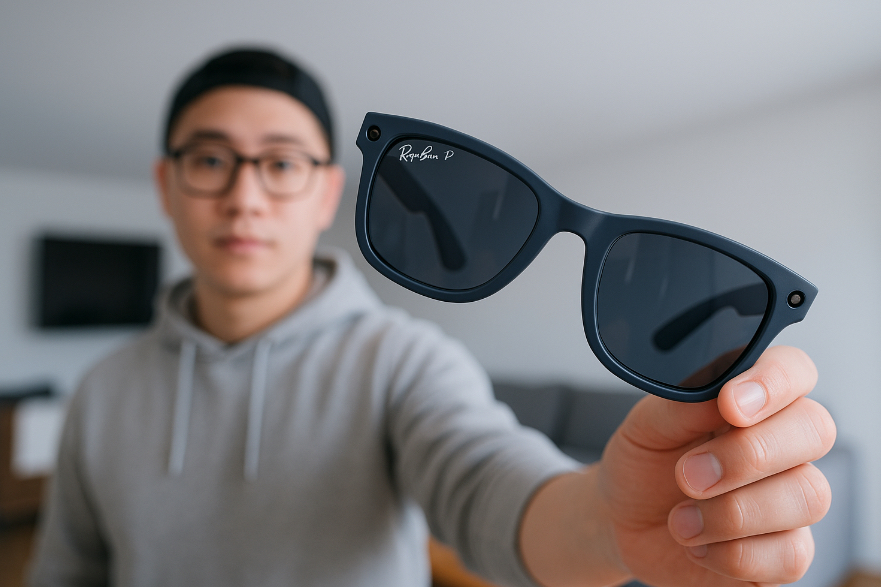In the bright and imaginative world of Star Trek, the universal translator was less a piece of technology than a simple given—a background enabler of seamless galactic diplomacy. With a flicker of light or the touch of a communicator badge, Klingon barks, Vulcan logic, and Bajoran debates could be rendered into fluent, crisp English without so much as a pause. The dream was never about just understanding language; it was about unlocking a human future unburdened by barriers.
In 2025, Meta is taking another ambitious step toward making that dream a reality—not in the distant cosmos, but woven invisibly into our everyday lives.
Through a quiet announcement last week, Meta revealed that live translation via its Ray-Ban smart glasses will no longer be a limited beta test. It is officially rolling out to all owners, turning a unique convenience into something closer to a democratized new norm. Suddenly, the promise of holding real-time conversations across English, French, Italian, and Spanish—simply by wearing a pair of glasses—is no longer science fiction.
It’s reality. And it’s just the beginning.
The Mechanics of a New Language
At first glance, the feature feels almost deceptively simple.
If you’re an English speaker, you begin by activating live translation with a voice command to Meta. Speak the request, and the glasses prepare to mediate language as naturally as they would adjust volume or take a picture.
Now imagine yourself at a bustling cafe in Milan. A barista launches into rapid Italian. Your Ray-Bans pick up the words, process them, and seamlessly translate them into English directly into your ears. No awkward fumbling for a smartphone. No hasty Google searches. No strained smiles and apologetic shrugs. You simply hear your native tongue.
Respond in English, and if the other person has their own smart glasses—or the Meta app on a smartphone—your English is translated back into Italian, flowing into their ears or across their screen. The rhythm of human interaction is preserved: speech, pause, response, laughter.
It feels… natural.
By allowing users to pre-download supported languages, Meta also solves one of the major Achilles’ heels of most modern tech: connectivity. No cellular dead zone, no lost Wi-Fi signal, no missing words. Whether you are deep inside a museum, a remote vineyard, or even trekking far outside the reach of traditional infrastructure, your Ray-Bans retain their ability to dissolve the boundaries of communication.
The Elegance of Embedded Tech
Meta’s rollout reflects a fundamental truth about technology adoption: the best tools are invisible.
Unlike smartphones, which demand attention and a dedicated grip, smart glasses function as extensions of our perception. They live in the periphery, augmenting reality without commanding it.
Ray-Ban’s classic, almost stubbornly analog design language furthers this mission. From a distance, they look no different from stylish sunglasses you might pick up from an upscale boutique. No thick antenna, no bulbous camera, no clunky frame betrays the power humming just above your temples. The beauty of the design is that the technology does not scream; it whispers.
That subtlety matters.
In a world increasingly wary of obtrusive tech, where a visible smartphone instantly severs eye contact and shifts attention, the integration of live translation into everyday eyewear feels almost humane. It supports, rather than replaces, human interaction.
The Practical Renaissance of Travel, Education, and Entertainment
The implications are enormous—and not merely for the traveler ordering lunch in a foreign land.
Education stands poised for a transformation. Imagine attending a lecture from a French historian without a translator’s interjection. Imagine students in Mexico sitting in on a live physics seminar from MIT, their glasses quietly smoothing the language hurdles. Academic exchange, long the domain of multilingual elites or expensive interpretive services, could become breathtakingly egalitarian.
Entertainment similarly opens up new vistas. Films, television shows, plays, and public lectures could become truly globalized experiences. Audio dubbed directly into your ears, without the clunky experience of a delayed voiceover or distracting subtitles, redefines immersion. A German play in Berlin, a Japanese musical in Tokyo, a Spanish-language documentary in Mexico City—all can be experienced in a personal, immediate way without losing cultural nuance.
Daily life itself changes. Instructions in public transport systems, emergency information in airports, socializing in multinational cities—all become easier, safer, more accessible. Tourists once isolated by the sheer stress of misunderstanding can move through cities like citizens, emboldened by the confidence that they will be understood—and that they will understand in turn.
The Limitations and Challenges Ahead
For all the magic of this moment, it is still necessary to recognize where the technology remains in its infancy.
First, language coverage is still narrow. English, French, Italian, and Spanish are a powerful quartet, but the absence of languages like Mandarin, Arabic, Hindi, Japanese, Russian, and Portuguese leaves much of the world waiting. Expanding into more languages will require not just technical updates but delicate handling of dialectical differences, regional variations, and cultural idioms.
Second, nuance remains elusive. Human communication is more than words—it is tone, gesture, facial expression. No translation, however deft, can perfectly convey sarcasm, irony, cultural allusions, or historical weight. The glasses may deliver “what” is said, but not always “how” it is meant.
Third, there is the looming question of privacy and consent. Recording and translating conversations, even if only temporarily stored, raises new ethical dilemmas. Is the person speaking aware they are being translated? Does their consent matter if the system is local and transient? Could malicious users exploit translation to misrepresent conversations?
Meta, a company already burdened by privacy controversies, will need to tread carefully here, ensuring that the excitement of innovation does not trample the necessary architecture of trust.
A Cultural Shift in the Making
Despite these challenges, one truth feels inescapable: we are on the cusp of a cultural shift as significant as the birth of the smartphone.
Just as the mobile phone dissolved the strict geography of communication—no longer tied to home phones or payphones—wearable translation dissolves the strict geography of language. Borders shrink not through treaties or wars, but through soft, almost imperceptible changes in how people connect.
In a world increasingly strained by nationalism, misinformation, and cultural misunderstanding, the ability to communicate simply, clearly, and humanely feels less like a convenience and more like a necessity.
Technology, when deployed with care, can act as a bridge rather than a barrier.
Meta’s Ray-Ban glasses are not the universal translator. Not yet. But they are a compelling first draft of a world where the language you speak matters less than the ideas you share.
And that feels revolutionary.
A Future Worth Wearing
It is easy to be cynical about tech announcements. Too often, promises are overhyped, features are abandoned, and initial excitement curdles into disappointment. But sometimes, quietly, almost shyly, real change emerges.
Meta’s expansion of live translation is not the loud arrival of the future. It is the future slipping into our pockets, resting lightly on our faces, and asking for nothing more than to be used.
There will be competitors. There will be better models. There will be glasses that translate Mandarin poetry, Swahili proverbs, Portuguese lyrics. But those are tomorrow’s news.
Today, for the first time in human history, it is possible to hold a conversation with someone in a different language—with no device to hold, no app to tap, no permission to ask. You simply speak.
Meta’s Ray-Bans listen.
They understand.
And they answer.
It is, in its own quiet way, the most human technology we have yet built.
No comments yet.








